Stomach pain and Parkinson's Disease
Stomach pain and Parkinson's Disease are closely linked; there is increasing evidence that erosion of the lining of the upper gastrointestinal tract may also promote injury to the dopaminergic cells in the brain.
 Dopamine from fava beans protects the lining of the stomach
Dopamine from fava beans protects the lining of the stomachGastrointestinal dysfunction
Parkinson's Disease (PD) is the fastest growing neurodegenerative condition. Loss of the hormone dopamine results in tremors, body stiffness and other symptoms such as constipation; and dementia too.
Dopamine is the precursor of norepinephrine that stimulates contractions in the colon; difficulty on the toilet is a common early sign. This is usually missed since only 5% of those enjoying typical grocery store food are getting enough fibre; it's assumed that the cause of the constipation is dietary.
New research published in the Journal of the American Medical Association[1] has found that those with a long history of stomach pain and gastric mucosal damage from peptic ulcer disease are also at risk of PD.
Braak's hypothesis
Braak's hypothesis has long proposed that toxic substances such as dry cleaning solvents, certain herbicides and the Helicobacter pylori bacterium may initiate the Lewy Pathology in the brain that is found in the neurodegenerative diseases; the toxic alpha-synuclein proteins are carried to the Substantia Nigra nucleus via the vagus nerve[2].
This "gut-first" supposition focuses on the breakdown of the mucosal lining allowing toxic substances to be absorbed into the body.
Thus the "leaky gut" may be the first step allowing many different substances to pass either via the blood stream or the vagus nerve to the brain. Numerous studies have shown that those suffering from Parkinson's Disease often have a long history of peptic ulcers for example.
Research
After following nearly 10,000 patients for 20 years researchers found that those with a history of mucosal damage of the upper GI were more than four times at risk of developing PD. Stomach pain, peptic ulcer disease and reflux were common symptoms.
Constipation was an early common symptom too but this was not considered part of the cause of PD but a consequence of a deficiency of the cholinergic hormones.
Early prevention
So much of healthcare is based on early detection and treatment; prevention is rarely mentioned. Cynics would suggest there is no money to be made in staving off disease.
Consider these three suggestions about the prevention of stomach pain and Parkinson's Disease.
1. The microbiome
There is strong evidence that both Helicobacter pylori and E coli infections can be cured by the use of probiotic foods such as kefir, sauerkraut and kimchi. Flooding the gut daily with the "friendly flora" helps to overwhelm the pathogens.
The microbiome is negatively affected by agricultural chemicals like Roundup. These pesticides increase the risk of cancer but also of Parkinson's Disease.
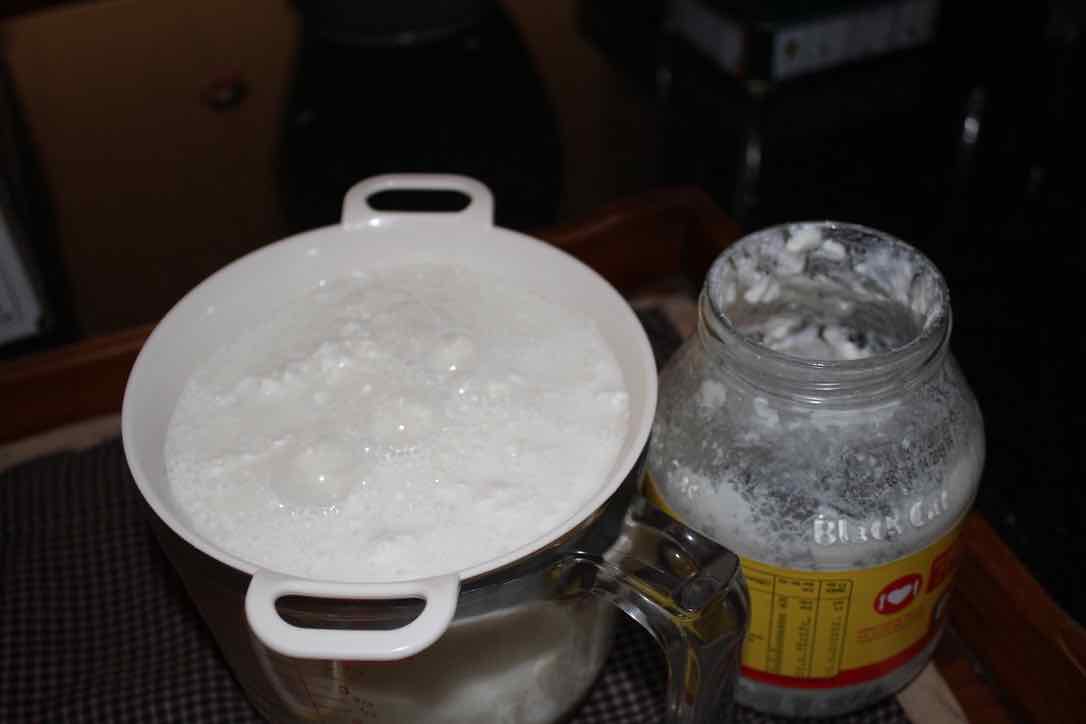
2. Fava beans
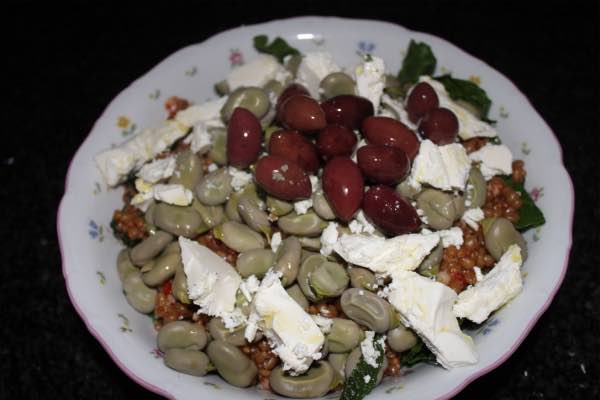 An anti-inflammatory fava bean salad
An anti-inflammatory fava bean saladFavas are the only known source of pharmcological amounts of L-dopa, the precursor of the hormone. Provided they are not skinned, a common practice of those eating the dried beans, they are also an extremely good fount of dietary fibre.
Early prevention of those suffering from stubborn constipation and early tremors may well go far to mitigate against stomach pain and Parkinson's Disease.
L-dopa medications are the chief treatments of PD; dietary sources of the amine may also play a role in preventing the condition in the first place.
Traditional understanding of the disease is that death of the dopaminergic fibres in a nucleus in the brain known as the Substantia Nigra is the cause of a deficiency of the hormone. But increasingly researchers are finding that the gut has an important role to play in the development of Parkinson's Disease.
Dopamine is known to protect the gut from mucosal damage[3] and so regular consumption of fava beans is also likely to mitigate against any progression of stomach disease.
3. Other sources of fibre
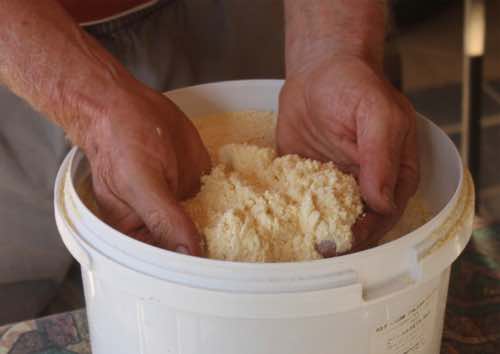 True grits has all the bran and germ
True grits has all the bran and germChronic constipation is strongly associated with many other bowel diseases. Those with suspected early Parkinson's Disease would need to consume more than the recommended 35 grams per day; remembering that only 5% of those eating mainly grocery store food are achieving even that.
More difficult is that the public in general shuns fibre-rich foods; they require more chewing, take longer to prepare and are increasingly difficult to purchase in the average grocery store. True wholegrain wheat flour and cornmeal barely exist.
Two exceptions are 100% corn grits and sourdough bread baked with completely unrefined flour. These have to be consumed with a week of being ground so access to a mill is essential.
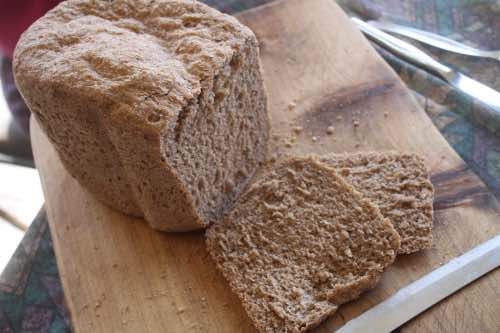 True unrefined flour has all the germ and bran
True unrefined flour has all the germ and branStomach pain and Parkinson's Disease
A history of mucosal damage, stomach pain and Parkinson's Disease is the norm; more emphasis needs to be placed on prevention rather than early diagnosis and treatment.
Fava beans are not difficult to grow and the surplus can be easily frozen for daily consumption by those fearing the worst. But the plants are finicky and labour intensive so farmers are not likely to grow them.
Interestingly in all five of the Blue Zone countries where ten times as many people live into strong and vigorous old age, they grow and consume fava beans.
They are also known as broad beans. You will probably have to grow them yourself for protection against stomach pain and Parkinson's Disease.
Overdosing
Those taking medication for Parkinson's Disease should only eat fava beans under the supervision of their doctors; overdosing with L-dopa can occur.
It is recommended that one cut back on the medication and begin eating 5 broad beans twice a day. The young pods have even more L-dopa. Obtained naturally with slow release from your food, many find that it smooths out the on and off periods associated with the drug.
Imaginative cooking
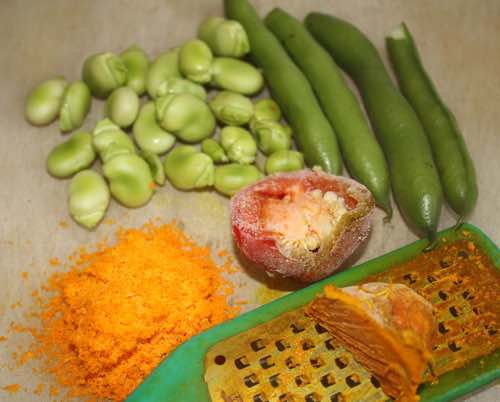 Broad beans with peppadew and turmeric
Broad beans with peppadew and turmericYoung fava beans have a slightly sweet, pleasant flavour but once they get older they become starchy and lack taste. Imaginative cooking with herbs and spices will be necessary to make them more palatable.
Back pain
The muscular rigidity and unusual gait known as festination that characterise those suffering from Parkinson's Disease also means a greater likelihood of lower back pain. Many of them find their way to chiropractic clinics.
When browsing these links use right click and "Open Link in New Tab", or you may get a bad gateway signal.
Did you find this page useful? Then perhaps forward it to a suffering friend. Better still, Tweet or Face Book it.
